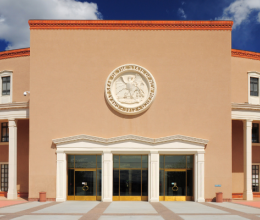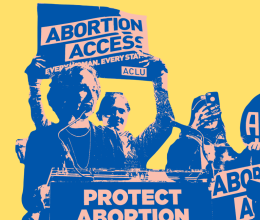“There’s something in my chest that pounds with the thump, thump of desperate college dorm rooms and the thump, thump of rum soaked nights. It is the beating of my fists against a strange man – thump, thump – with his hand down my shirt and his tongue in my mouth, whenever I try to speak about the problems of wearing a dress. There are eyes on my body, old or young, but always hungry and they stare at my quivering form underneath a veil of “I’s,” as in I should not have drank so much, or I should not have teased.” Danielle Ho, Thump Thump
On November 14, together with coalition partners in Respect NM Women, the ACLU of New Mexico co-hosted the second annual “Respect 140” event, a night of storytelling, performance, and poetry featuring 20 speakers who each had 140 seconds to raise their voices in support of reproductive health and justice and against gendered violence in all its forms.
UNM student Danielle Ho, read Thump Thump, a poem she wrote while grappling with her two close friends’ experiences of sexual assault. In writing Thump Thump, Danielle’s own memories of assault, buried deep within, bubbled to the surface.
“There are so many people stronger than me who have found the courage to speak out about their own assaults, and I knew that I had to ride their momentum before I lost my own,” said Danielle. “This event is only the third time that I told other people that I have been assaulted. It was hard enough to say it out loud the first time, and it damn nearly ruined me the second. Sharing the details are still difficult to share, and it was the hardest to tell my mother—but this event marks a step forward in the right direction, I think. I was so young when I was assaulted. It took me all these years to find the resilience to say that out loud.”
Danielle is one of countless women across the country who have had enough. They’ve had enough of the constant threat of sexual assault and harassment. They’ve had enough of the feelings of shame and powerlessness that silence them. They’ve had enough of smiling men in fitted suits passing laws that exert control over their bodies, while a growing number of these same men stand accused of heinous crimes against women.
And is it any wonder? Donald Trump gloated about sexually assaulting women and still won the presidency. Harvey Weinstein pretended to be an ally to women while he preyed on them for decades, shielded by money, power, and the complicity of the entertainment industry. Alabama Senate candidate Roy Moore stands accused of multiple incidents of pedophilia and sexual assault and as of this writing is still the frontrunner in Alabama’s special election.
We’re in a unique moment here in our country. Gender-based violence, sexual assault, and attempts to control women’s reproductive lives are nothing new in our society. But this past year has been a tipping point, and women are speaking out and fighting back in numbers we haven’t seen before.
An estimated five million women and allies took to the streets the day after Trump’s inauguration. Millions worldwide have used the #metoo hashtag to share their personal stories of harassment and assault. Survivors of sexual harassment and assault have been coming forward in historic numbers to expose abuse in entertainment, media, finance, and politics, creating what the media has called a “watershed moment.”
Like so many rain drops, released in mass from swollen clouds into an aging dam, women have begun to breach an enduring, but crumbling system of oppression.
Like so many rain drops, released in mass from swollen clouds into an aging dam, women have begun to breach an enduring, but crumbling system of oppression.
New Mexico communities have been on the front lines of this mass movement. Like women across the country, New Mexico women have experienced sexual harassment, assault, and rape. They have been shamed, violated, and silenced. Every year, New Mexico politicians try to pass laws that would strip women of the ability to make decisions about their own reproductive health. But New Mexico women are fighting back and demanding the respect they deserve. They’re not only calling out sexual harassment and violence, but they’re calling out the onslaught of attempts to exert control over their bodies.
Try as some people may to separate these two issues, they can never be torn apart. Every executive order, every bill, and every administrative tweak to reproductive health access that threatens women’s autonomy is an act of violence, often cloaked in misleading language of fear and protection.
For women and families to live safe and healthy lives, they need access to the full range of family planning and pregnancy-related services, including abortion. If these services become unavailable, women who are not ready or do not want to be pregnant may undergo unsafe procedures, risking their lives like they did for so many decades before Roe V. Wade. Pregnant women who are eager to be mothers, but who experience complications, may suffer life-threatening barriers to service. Women who are already mothers will be stripped of the ability to make their own personal decisions about what is best for the families they love and care for. These realities will fall hardest on women of color and low-income women who lack the resources to overcome legal obstacles safely. For all people to live in dignity, we must continue to call out gendered violence in all of its forms so that it can be stopped.
To proactively build a platform for women’s voices and power in New Mexico, the ACLU of New Mexico works with Respect New Mexico Women, a movement of women, families, faith leaders, medical providers, and community-based organizations that is fighting every day to keep deeply personal decisions about abortion and reproductive health between a woman and her medical provider. We’re pushing back against bad legislation and advancing proactive bills, but we’re also speaking out and encouraging women and their allies to share stories about abortion, pregnancy, fertility, miscarriage, and sexual assault to end the stigma and shame that surround reproductive choices and experiences.
Respect 140 packed the auditorium at the National Hispanic Cultural Center and featured compelling presenters from diverse communities and walks of life.
Hadley Brown, a New Mexico public defender, spoke to a public audience for the first time about an emotional experience - - an abortion she had when she was just 16 years old and the turmoil that followed.
“Many of us have abortions. It is a common experience. But we feel our shame in isolation. The isolation allows shame to swell in our throats and bellies and it deadens our voices,” said Hadley. “The shame and fear that follows abortion and sexuality is manufactured in our culture. The whole time I felt unworthy of my life I did not realize the shame belonged to others.”
Others, like UNM student Isabella Baker, called out the catch-22 women face. If they decide to have children when young, they’re sneered at for being “teen moms.” But if they decide to have an abortion, they’re shamed. As the child of young parents, she knows the scorn all too well.
“Women are reprimanded every day for exercising their rights to make their own choices about their own bodies and it’s no one else’s business,” said Isabella. “It’s hypocrisy to bash women’s rights to abortion and then turn around and reprimand women who have a baby very young.”
Nikki Archuleta read a powerful letter aloud addressed to those that trample on women’s rights, violate their bodies, and shame them for their decisions and experiences.
“We are all taught that our bodies are not our own. That our rapist’s college experience is more important than the womb in which life blossoms. That we as women are not allowed self-expression because when men violate our bodies it becomes a conversation of ‘she was asking for it’ and not ‘he will be held responsible.’ That our ovaries don’t belong to us, but to the men who constantly infringe upon our rights,” said Nikki.
“We are all taught that our bodies are not our own. That our rapist’s college experience is more important than the womb in which life blossoms.” said Nikki.
Whether women spoke about miscarriage, birth, abortion, inequality, or assault, in each case they courageously owned their voices and their experiences. Events like Respect 140 take shape within the context of a large and powerful movement that is demanding an end to violence against women in all its forms, including the violence that results from trampling on their decision-making power and the violence of assault, sexual or otherwise.
We are deeply grateful to all of the brave women and survivors across the world, country, and New Mexico who are sharing their stories and turning the tides of injustice, for their words weigh heavy on the foundations of oppression.





